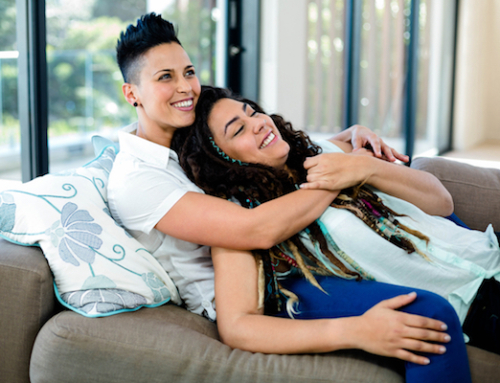Tips for dealing with jealousy in your relationship
Even though we would like to deny it, jealousy, the fear of losing our partner’s affection or the threat of damaging the “specialness” of the relationship is extensive in our community. As lesbians, we often find ourselves in an environment where the potential for jealous feelings erupting is very high. For example, since our friends tend to be other women—often other lesbians—our friend relationships may often be perceived as threats to our primary relationship. In addition, the prevalence of social networking sites, including Facebook, as well as overindulgence in alcohol often fuels the fire.
Jealousy is simply an emotion. Emotions in and of themselves, should not be judged. However, when jealousy takes hold and paralyzes us with obsessive thoughts and fears and, even worse turns into abusive and destructive actions, something must be done.
In addition to being jealous of another person in a romantic sense, we can also experience this emotion around our partner’s career, pets (“you cuddle more with our dog than you do with ME!”), her family, or even her hobbies and interests.
Causes of Jealousy
Simply put, jealousy is often the result of both the way we’re feeling about ourselves and about our relationship. The reasons are not always clear, but overwhelmingly, jealousy arises when we’re not feeling good about ourselves. These are times when we’re feeling inadequate, insecure, and depressed—maybe that job promotion didn’t materialize or you haven’t yet shed those twenty pounds after the holidays, or you’re still closeted at work or with your family. So it stands to reason that if you’re in a bad place, you might fear the loss of the relationship. And remember, it’s just your fear, not a reality. Or, as some folks say, FEAR means, Future Events Appear Real. And when you’re alone with a fear, you’re going to tend to magnify it, and blow it out of proportion.
In addition to looking at yourself, you also need to assess your relationship. How much quality time have you been spending together? How has your communication been? Has your sexual relationship changed significantly in the last few weeks or months? And if you’re asking, “What sexual relationship?” that can certainly ramp up your feelings of jealousy! What is the trust level in your relationship? Have you given each other attention lately? Answers to questions such as these may give you more of an idea as to the reasons for the jealousy.
What to Do
When jealousy arises in a relationship, there are many ways in which to deal with it.
If you are the person who is feeling jealous
• Examine your self-concept. Have you been taking care of your needs and doing the things that make you feel happy and productive? Or have you been isolating yourself, hence feeling negatively about you? Have you been engaging in suspicious activities that contribute to these feelings, such as snooping through your partner’s journal, e-mails, or text messages?
• Talk to your partner. When you feel the slightest amount of jealousy, approach your partner/spouse in a vulnerable way sharing your feelings versus attacking and accusing her. If you do not do this, resentment and anger will build over time and resolution will become difficult if not impossible.
If your partner is feeling jealous
• Be as reassuring as possible; openly communicate your feelings for her in an honest and sensitive way.
• Ask your partner/spouse what would make her feel better about the situation. If a third party is involved, try to include your partner/spouse in some of your conversations or times together. Since exclusion often heightens jealous feelings, give her the option of being included on occasion. And if your “friend” balks at the suggestion of including your partner, seriously reassess this person’s relationship to you.
• Share with your partner/spouse the ways in which your interaction with the third party (or activity) enhances your relationship with her. For example, “when I come home after spending time with my book club, I have so much more to share with you.”
Finally, remember that jealousy does not occur in a vacuum. Both partners contribute to this dynamic. However, if the problem persists, it’s very important to seek the help of a counselor or another objective helper.






